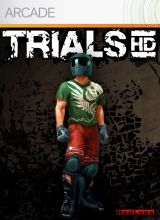
Games are virtual. When you turn on the console, a world appears; when you turn it off, no trace remains. Except for the achievements you earned -- which fortify your Gamerscore and self-esteem, blip by blip. The Underachiever tracks the productivity of one gamer playing to catch up to his peers. What do games feel like when they're used for work?
Never Let Me Go
More than any others I have seen, the achievements in Trials HD test your ability to play the game. But this is only because they can't avoid doing so. Trials HD has no exploration, little room for experimentation, and certainly no playing around. Trials HD is your performance. The split-second you stop trying to clear a three-story mound of monster tires is the same instant the game loses its meaning (and you have tumbled into a fire pit).
It wouldn't be earth-shattering to compare Trials HD to an instrument. Games from Guitar Hero to Lumines have made explicit the analogy between games and music. But it's "gameplay" games like Trials HD, Geometry Wars: Retro Evolved 2, and Street Fighter IV that I find more illuminating.

Take 15G: Market Meltdown. You get this achievement for taking an alternate path in the Stock Market level, and your chances of finding it on a whim are unlikely. Like all the game's levels, Stock Market is meant to unroll in a taut line from left to right as you scale obstacles, jump gaps, and otherwise try not to tip your bike. You have no in-game incentive to look for secret jumps and alternate paths through the level, and no hint of where an achievement might be hidden.
At one point in Stock Market, you find a ramp nestled directly beneath the one you're on. Launching yourself from this ramp takes you to a previously unseen area with a (literal) dead end.
It hardly feels like an achievement once you've made "the fall and the big bang," as the blurb puts it, but neither is it simple to come by. To get to the starting area, you tip yourself off the regular path at such an angle that you hit the leading edge of the ramp below with your neck, thus keeping you from falling off your bike, which you then ease backward onto the ramp. Then you scale some unlikely slopes before finally coasting to the end of the path for your points. The straight shot that ends this section of the level is anticlimactic, and so the achievement feels less than spectacular.

And yet it's clearly the result of an elaborately orchestrated performance by designer and player alike. In The Underachiever #5, I figured that making an achievement should feel like flipping a light switch. Your actions would lead naturally to the reward. This one, though, is more like building the circuit that lets you flip the switch.
Or driving a motorbike through the circuit. This isn't about reward as much as execution, the difference between accomplishment and performance. You did it, in other words, and it was done. It's hard to tell why Market Meltdown is a notable thing; most likely, you did the achievement because you were piqued by the description and looked up the trick, like me.
Yet, knowing the answer to this kind of achievement is less than half the answer. For 15G: Strike!, I replayed the same foot-long section of level dozens of times before finally getting all the giant-sized bowling pins to topple on impact with my body. And 15G: Full Throttle, which asked me to finish the level without ever letting go of the throttle, was a constant wobble on the edge of control.

It's total control that validates Trials HD's achievements, and that verifies that the game is being played. This may seem like a given. But some games go on when you release control: Plants fight zombies; Liberty City acts like New York; Little Sisters and Big Daddies do their thing. In contrast, games like Street Fighter IV and Trials HD enter a kind of coma. They need your constant input in order to appear alive.
This raises a bigger question about why we provide that input. Increasingly nowadays, we play games to see what they have to show. Games like BioShock, Mass Effect 2, and Red Dead Redemption really are no different from conventional films or novels in this way: They ask us to be patient as themes play out and ideas are told. Days, weeks, or months later, they argue, we will know why we played. It makes only too much sense that something like Grand Theft Auto IV -- which combines a postmodern stage and ponderous script -- is taken as the expressive hope of the medium.
Meanwhile, the likes of Street Fighter IV or Trials HD, which we play for the sake of playing, are regarded as either pure wastes of time or some kind of throwback. The real difference is that while they have nothing in particular to show us, they ask that we show something for ourselves. It's not a given that we will all "finish" (and then contemplate our experience of) Trials HD. Appreciating the game isn't a matter of time -- like turning pages or letting a film reel spin -- but a matter of effort.
I'm not making an argument for skill. I'm making a distinction between knowing a game's plot, characters, themes, and ideas... and knowing a game as a familiar. "Gameplay" games, like instruments, show their secrets and their value as we get better at them.

We're still hard-pressed to describe the experiences that games give us outside of narratives, themes, and ideas. But maybe achievements can serve as a useful trace. 20G: Life is Harsh both names and describes my process of completing Trials HD's Hard levels. These surreal courses -- filled with flame, collapsing bridges, and majestic towers of trash -- felt like a purgatory built by junkyard devils. The better my fingers understood when and how to apply pressure on the gas and the rider, the more clearly the thoughts of the designer echoed in my mind. The things that still linger are an image of planks pointing skyward, my acceleration around a loop-de-loop, and the painstaking lilt of a secret ramp. The achievement I ended up with suggests that these shared moments were real.
The bond between player and designer is harder to put into words than a game's story and subtext. That's because it is inherently abstract, a highly personal thing. But so is a song.
Achievements earned: 8
Points gained: 100
Ryan Kuo is an editor at Kill Screen Magazine, and a freelance writer and artist based in Brooklyn, NY. Find him on Xbox Live and Twitter as twerkface. And please don't laugh at his Gamerscore -- he's working on it.




